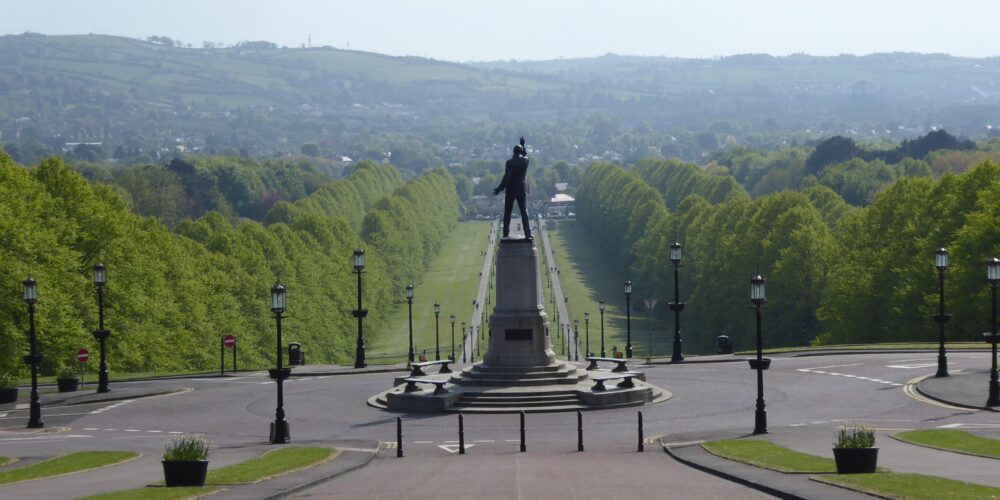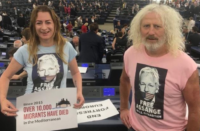Fifty years after the collapse of the first attempt to reform the governance of Northern Ireland, the six county state remains a hopelessly failed political entity. Not only is it afflicted with the chaotically dysfunctional local Stormont administration, but lurking always in the background is manipulation by Britain’s Deep State.
To get an insight into the extent of local mismanagement, look at proceedings during the recent UK government’s Covid 19 enquiry into how the pandemic was dealt with by the Assembly and its minsters.
Sheer incompetence, party political point-scoring and bureaucratic foot-dragging were just some of the inadequacies highlighted during the course of the investigation. And all the while in the midst of the crisis, members of the executive were deliberately leaking sensitive information in order to undermine political rivals.
The outstanding moment of the hearings was undoubtedly the performance of Northern Ireland’s First Minister, Michelle O’Neill. For starters, there was the issue relating to her deletion of sensitive messages from her WhatsApp account. In spite of having been given specific legal advice not to do so, she wiped her device.
Then again there was her apology for attending a large funeral during “lockdown”, an astonishing U-turn from her position of denial at the time of the incident. Her apparent contrition was made all the more remarkable by her assertion that she was unaware during the occasion that her presence at such a large, well-publicised event would have annoyed and offended others prevented from attending their relatives funerals. Notwithstanding all this, there is no present day “O’Neill must go” campaign.
While the First Minister’s testimony was undoubtedly proving a hard act to follow, the DUP endeavoured not to be outdone. Former First Minister Arlene, now Baroness, Foster refused to accept any liability for excess fatalities due to delayed restrictions. Instead, she blamed the health minister Robin Swann for delivering poor briefings to the executive.
It further emerged during a sitting that the Baroness had failed to discipline her party colleague Edwin Poots for his ridiculous and unsubstantiated assertion during the pandemic that virus transmission rates were six times higher in nationalist areas than in nearby unionist districts. Since then, Poots has been appointed speaker of the Stormont Assembly and apparently retains the confidence of the house.
Bear in mind too that the UK government identified the outbreak of the serious, contagious Covid-19 pandemic in March 2020, advising people to work from home if possible. Almost simultaneously the findings of Patrick Coghlin’s enquiry into the infamous “Cash for Ash” or RHI scandal/fiasco were being published. So in other words, no sooner had the devolved administration in the Six Counties emerged damaged from one shambles than it contrived to embroil itself in another.
One might well be inclined to ask whether the situation in this zombie political entity can get any worse, but in reality it does. Evidence is emerging, almost by the day, that proves what many have long known is that the British Deep State directed a covert and bloody campaign in the North over the duration of what is euphemistically referred to as “the Troubles”. It did so, moreover, not to stem violence but instead to determine the outcome of events in its oldest colony.
Over twenty years ago, John Stevens, former head of the London Metropolitan police revealed in his report that of 210 loyalist suspects arrested by his enquiry team, 207 were employed as informants. In other words, they were agents of the state. Only the willfully naïve would refuse to believe that those handling these agents were not just collecting information but also directing their activities. Quite simply, why retain such an overwhelming percentage of state agents when the obvious course of action would have been to order them to stop? Unless of course, the state had other reasons for their continued employment.
More recently, Iain Livingstone, the man in charge of Operation Denton, which is examining, among other atrocities, the Dublin and Monaghan bombings, was interviewed by RTÉ’s Prime Time. He was unequivocal: “I can say categorically there was collusion. We know that to be true,” referring to the events of 17th May 1974.
The above are but two examples in a long list of Britain’s Deep State – and let’s use the term – directing terrorism in Ireland. No need, therefore, to ask the reason for the UK government’s determination to close down all avenues of inquiry into the past. The Legacy Act is not designed to protect ageing squaddies, but to safeguard the dirty secrets of their former employer.
There remains, however, one outstanding question in all of this. With so much incontrovertible evidence of the dysfunctional, unsustainable nature of the six county state, why is the Irish government not proactively seeking its dissolution?
Is it possible that the car bombs 50 years ago were a warning of “terrible and immediate war” should Dublin interfere with Britain’s interests in Ireland?
Plus ça change?






